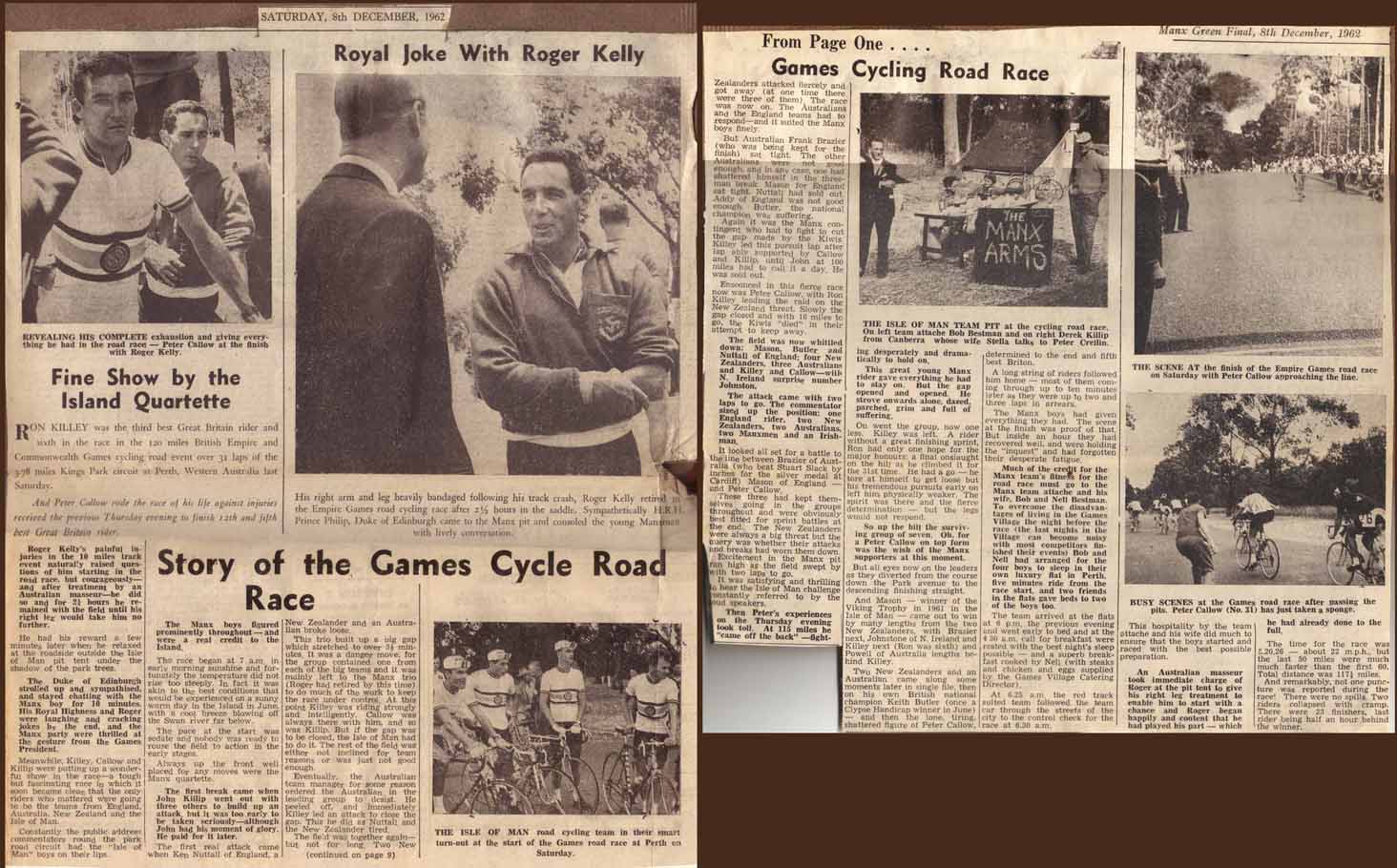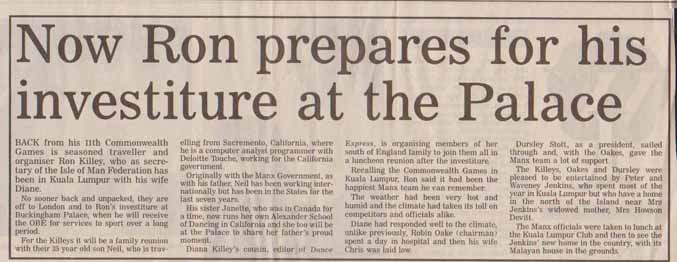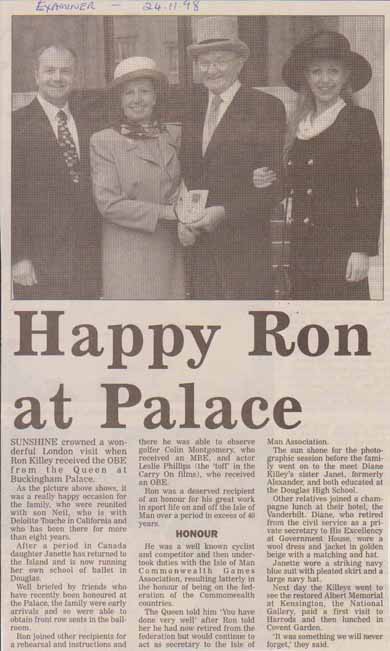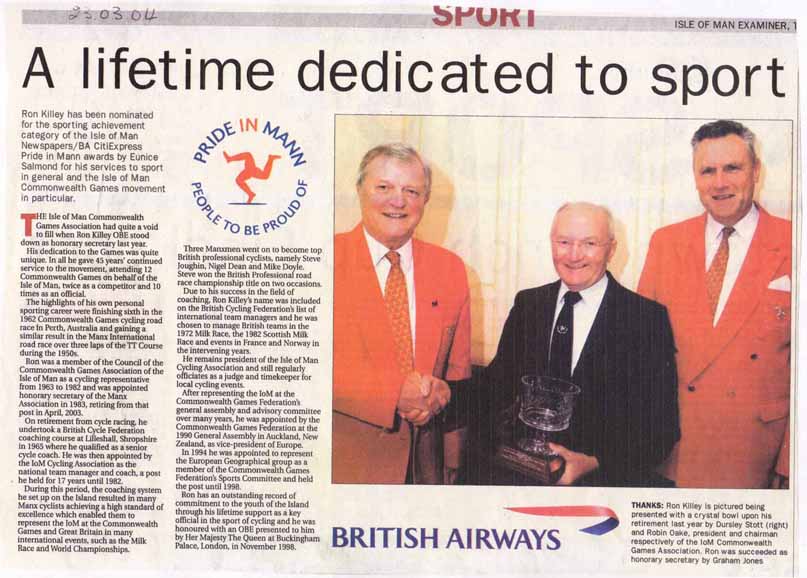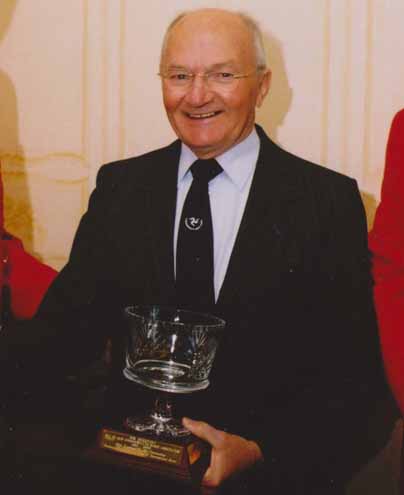| The Manx Green Final, 8 December 1962
Text: Fine Show by the Island Quartette
Ron Killey was the third best Great Britain rider and sixth in the race in the 120 miles British Empire and
Commonwealth Games cycling road event over 31 laps of the 3.78 miles King Park circuit at Perth, Western Australia
last Saturday.
And Peter Callow rode the race of his life against injuries received the previous Thursday evening to finish 12th and
fifth best Great Britain rider.
Roger Kelly's painful injuries in the 10 miles track event naturally raised questions of him starting in the road race,
but courageously - and after treatment by an Australian masseur - he did so and for 2½ hours he remained with the field
until his right leg would take him no further.
He had his reward a few minutes later when he relaxed at the roadside outside the Isle of Man pit tent under the shadow
of the park trees.
The Duke of Edinburgh strolled up and sympathised, and stayed chatting with the Manx boy for 10 minutes. His Royal
Highness and Roger were laughing and cracking jokes by the end, and the Manx party were thrilled at the gesture from
the Games President.
Meanwhile, Killey, Callow and Killip were putting up a wonderful show in the race - a tough but fascinating race in
which it soon became clear that the only riders who mattered were going to be the teams from England, Australia,
New Zealand and the Isle of Man.
Constantly the public address commentators round the park road circuit had the "Isle of Man" boys on their lips.
Story of the Games Cycle Road Race
The Manx boys figured prominently thoughout - and were a real credit to the Island.
The race began at 7 a.m. in early morning sunshine and fortunately the temperature did not rise too steeply. In fact it
was akin to the best conditions that would be experienced on a sunny warm day in the Island in June, with a cool breeze
blowing off the Swan river far below.
The pace at the start was sedate and nobody was ready to rouse the field to action in the early stages.
Always up the front well placed for any moves were the Manx quartette.
The first break came when John Killip went out with three others to build up an attack, but it was too early to be
taken seriously - although John himself had his moment of glory. He paid for it later.
The first real attack came when Ken Nuttall of England, a New Zealander and an Australian broke loose.
This trio built up a big gap which stretched to over 3½ minutes. It was a danger move, for the group contained one from
each of the big teams and it was mainly left to the Manx trio (Roger had retired by this time) to do much of the work
to keep the race under control. At this point Killey was riding strongly and intelligently. Callow was always there
with him, and so was Killip. But if the gap was to be closed, the Isle of Man had to do it. The rest of the field was
either not inclined for team reasons or was just not good enough.
Eventually, the Australian team manager for some reason ordered the Australian in the leading group to desist. He
peeled off, and immediately Killey led an attack to close the gap. This he did as Nuttall and the New Zealander tired.
The field was together again - but not for long. Two New (continued on Page 9)
From Page One ....
Games Cycling Road Race
Zealanders attacked fiercely and got away (at one time there were three of them). The race was now on. The Australians
and the England teams had to respond - and it suited the Manx boys finely.
But Australian Frank Brazier (who was being kept for the finish) sat tight. The other Australians were not good enough,
and in any case, one had shattered himself in the three-man break. Mason for England sat tight. Nuttell had sold out.
Addy of England was not good enough. Butler, the national champion was suffering.
Again it was the Manx contingent who had to fight to cut the gap made by the Kiwis. Killey led this pursuit lap after
lap ably supported by Callow and Killip, until John at 100 miles had to call it a day. He was sold out.
Ensconced in this fierce race now was Peter Callow, with Ron Killey leading the raid on the New Zealand threat. Slowly
the gap closed and with 16 miles to go, the Kiwis "died" in their attempt to keep away.
The field was now whittled down: Mason, Butler and Nuttall of England; four New Zealanders, three Australians and
Killey and Callow - with N. Ireland surprise number Johnston.
The attack came with two laps to go. The commentator sized up the position: one England rider, two New Zealanders, two
Australians, two Manxmen and an Irishman.
It looked all set for a battle to the line between Brazier of Australia (who beat Stuart Slack by inches for the silver
medal at Cardiff) Mason of England - and Peter Callow.
These three had kept themselves going in the groups throughout and were obviously best fitted for sprint battles at the
end. The New Zealanders were always a big threat but the query was whether their attacks and breaks had worn them down.
Excitement in the Manx pit ran high as the field swept by with two laps to go.
It was satisfying and thrilling to hear the Isle of Man challenge constantly referred to by the loud speakers.
Then Peter's experiences on the Thursday evening took toll. At 115 miles he "came of the back" - fighting desperately
and dramatically to hold on.
This great young Manx rider gave everything he had to stay on. But the gap opened and opened. He strove onwards alone,
dazed, parched, grim and full of suffering.
On went the group, now one less. Killey was left. A rider without a great finishing sprint, Ron had only one hope for
the major honours: a final onslaught on the hill as he climbed it for the 31st time. He had a go - he tore at himself
to get loose but his tremendous pursuits early on left him physically weaker. The spirit was there and the fierce
determination - but the legs would not respond.
So up the hill the surviving group of seven. Oh, for a Peter Callow on top form was the wish of the Manx supporters
at this moment.
But all eyes now on the leaders as they diverted from the course down the Park avenue to the descending finishing
straight.
And Mason - winner of the Viking Trophy in 1961 in the Isle of Man - came out to win by many lengths from the two
New Zealanders, with Brazier next, Johnston of N. Ireland and Killey next (Ron was sixth) and Powell of Australia
lenghts behind Killey.
Two New Zealanders and an Australian came along some moments later in single file, then on his own British national
champion Keith Butler (once a Clypse Handicap winner in June) - and then the lone, tiring, shattered figure of
Peter Callow, determined to the end and fifth best Briton.
A long string of riders followed him home - most of them coming through up to ten minutes later as they were up to two
and three laps in arrears.
The Manx boys had given everything they had. The scene at the finish was proof of that. But inside an hour they had
recovered well, and were holding the "inquest" and had forgotten their desperate fatigue.
Much of the credit for the Manx team's fitness for the road race must go to the Manx team attache and his wife, Bob
and Nell Bestman. To overcome the disadvantages of living in the Games Village the night before the race (the last
nights in the Village can become noisy with most competitors finished their events) Bob and Nell had arranged for the
four boys to sleep in their own luxury flat in Perth, five minutes ride from the race start, and two friends in the
flats gave beds to two of the boys too.
The team arrived at the flats at 6 p.m. the previous evening and went early to bed and at the 4 30 a.m. call for
breakfast were rested with the best night's sleep possible - and a superb breakfast cooked by Nell (with steaks and
chicken and eggs supplied by the Games Village Catering Director).
At 6.25 a.m. the red track suited team followed the team car through the streets of the city to the control check for
the race at 6.30 a.m.
This hospitality by the team attache and his wife did much to ensure that the boys started and raced with the best
possible preparation.
An Australian masseur took immediate charge of Roger at the pit tent to give his right leg treatment to enable him to
start with a chance and Roger began happily and content that he had played his part - which he had already done to the
full.
The time for the race was 5.20.26 - about 22 m.p.h., but the last 50 miles were much much faster than the first 60.
Total distance was 117¼ miles.
And remarkably, not one puncture was reported during the race! There were no spills. Two riders collapsed with cramp.
There were 23 finishers, last rider being half an hour behind the winner.
Top left picture caption: Revealing his complete exhaustion and giving everything he had in the road race -
Peter Callow at the finish with Roger Kelly.
Top right picture under "Royal Joke With Roger Kelly" caption: His right arm and leg heavily bandaged following
his track crash, Roger Kelly retired in the Empire Games road cycling race after 2½ hours in the saddle.
Sympathetically H.R.H. Prince Phillip, Duke of Edinburgh came to the Manx pit and consoled the young Manxman with
lively conversation.
Top page, bottom right picture caption: The Isle of Man road cycling team in their smart turn-out at the start of the
Games road race at Perth on Saturday. Picture note: Ron is on the right.
Bottom page, top left picture caption: The Isle of Man Team Pit at the cycling road race. On left team attache Bob Bestman
and on right Derek Killip from Canberra whose wife Stella talks to Peter Crellin.
Bottom page, top right picture caption: The Scene At the finish of the Empire Games road race on Saturday with
Peter Callow approaching the line.
Bottom right picture caption: Busy Scenes at the Games road race after passing the pits. Peter Callow (No. 31)
has just taken a sponge.
|

-CollieMail.jpg)
